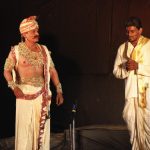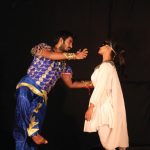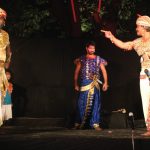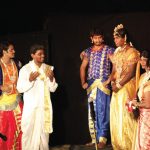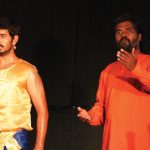Name of the play : SEEVAKA SINTHAMANI
Author of the play : J.APPANDAIRAJAN
Directed by : G.SREEDEVI
Seevakan was a hero born amidst chaos and irony in a graveyard, the last place where birth could take place. His father, a king, smitten by the beauty of his mother gave the duties of the state to his minister, who later killed the king to take over the kingdom. Seevakan was born to a fallen king and a queen. Yet, the community did not recognize his birth and higher stature. The epic is about how the talented Seevakan, after going through numerous conquests and challenges manages to reclaim his father’s kingdom and finally renounces everything to get liberated.
The epic comes from a monk, who has supposedly renounced the gratification that comes from physical pleasures. This very third person and transcendental perspective has enabled the author to give a treatise, which is aesthetically and linguistically brilliant.
The epic deals with characters, who have issues that are very universal. Seevagan fits perfectly to Aristotle’s descriptions of a tragic hero. Aristotle envisions a tragic hero whose birth happens in a very chaotic circumstance. The hero is denied his rightful stature in the community and he goes on a journey in search of a solution. Any incident or achievement, however great it maybe does not satisfy the purpose of the character’s existence. The final conflict that reveals the true identity of the hero puts him back into the community. The fact that an epic that is written in 9th Century AD deals with all these issues accurately is very interesting.
Seevaka Sinthamani has not yet been treated as extensively as Silappathigaaram or Manimegalai, in spite of it having such universal elements of theatre and drama. It also contains elements of magic and sorcery that are similar to Shakespearean plays.






